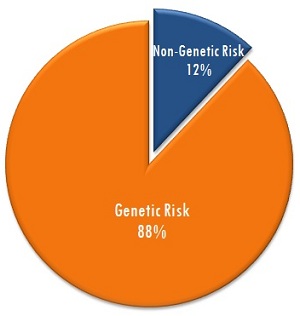Type 1 diabetes is an autoimmune disease where the patient develops antibodies which attack and destroy insulin producing beta cells in the pancreas. This results in insulin insufficiency or insulin resistance.

Environmental factors: Genetics alone may not lead to type 1 diabetes. The environmental factors definitely play a role.
Viral infection. There are many different type of viruses including coxsackie B virus, cytomegalo virus, congenital rubella, rota virus, etc. are thought to be triggers. A recent study labeled diabetes and autoimmunity study in the young (DAISY) in 2010 showed that there was evidence of enterovirus infection in individuals who were recently diagnosed with type 1 diabetes or pregnant women who is children developed type 1 diabetes.
Geographic factors: Interestingly, there is a higher incidence of type 1 diabetes in Northern Hemisphere compared to Southern. The difference
may be related to lack of vitamin K and/or D exposure early in the life which may put them at risk for type 1 diabetes.
Nutritional factors: Some studies indicate that breast-feeding may be protective against type 1 diabetes. There is also some evidence that introduction of gluten into an infant’s diet prior to 3 months and after 7 months has been associated with increased risk.
So, in genetically prone individuals, there is an environmental trigger that leads to break in immunologic tolerance and loss of beta cells. Over a period of time, usually many years, there is autoimmune destruction of insulin producing beta cells.
REFERENCES:
1. Simmons KM, Michels AW. Type 1 diabetes: A predictable disease. World J Diabetes. 2015 Apr 15;6(3):380-90.
2. http://www.nlm.nih.gov/medlineplus/diabetestype1.html
